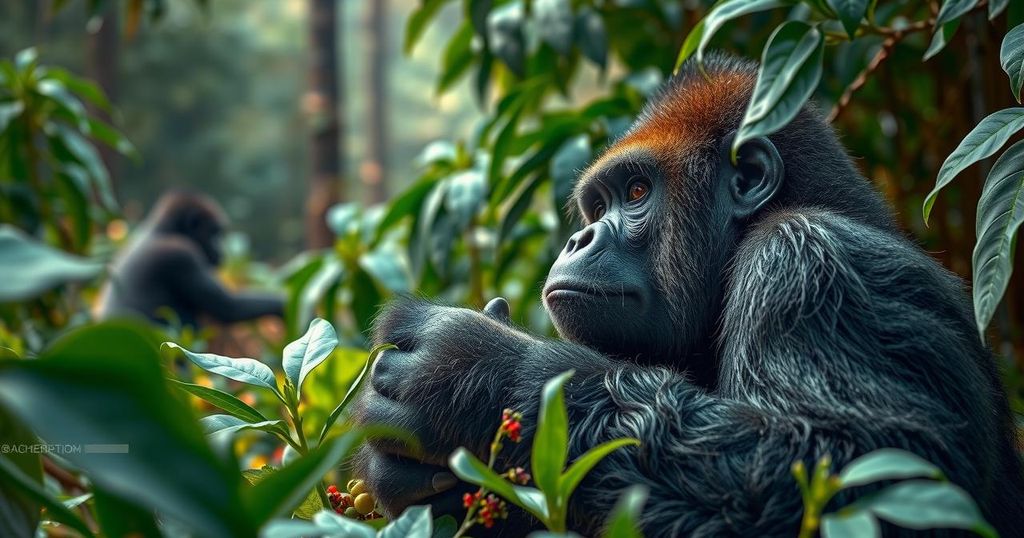According to the WWF’s 2024 report, mountain gorilla populations have increased by 3% annually since 2010 in the Virunga Massif of DRC, Uganda, and Rwanda. While this signals successful conservation efforts, the report also notes a 73% decline in global wildlife populations over the past 50 years, underscoring urgent ecological threats and the necessity for collective action to preserve ecosystems and resources vital to human existence.
The mountain gorilla population within the Virunga Massif, encompassing areas of the Democratic Republic of the Congo (DRC), Uganda, and Rwanda, has exhibited a consistent annual increase of 3% since the year 2010, as reported in the 2024 Living Planet Report released by the World Wildlife Fund (WWF) in Kampala. Notably, the population specifically in Uganda’s Bwindi Impenetrable Forest National Park and the adjacent Sarambwe Reserve has reached approximately 459 individuals. This encouraging growth statistic highlights successful conservation efforts, particularly in the management of protected areas, community engagement surrounding parks, and vigilant monitoring of habituated gorilla groups. However, it is important to contextualize this success within the broader scope of wildlife conservation, as the report reveals a stark overall decline of 73% in the average size of monitored wildlife populations globally over the past 50 years. This long-term decline serves as an alarming indicator of the escalating threats posed by climate change and habitat loss. The report delineates urgent warnings regarding ecosystem degradation, emphasizing that such declines not only compromise the species being monitored but also jeopardize essential ecosystem services upon which human societies depend. Potential tipping points loomed in various ecosystems, such as the Amazon, underscore the risks associated with continued environmental neglect. WWF International’s Director General, Kirsten Schuijt, articulates the gravity of the situation, urging collective action and reminding us that while the time for preventive measures is finite, humanity still possesses the power to alter the trajectory of ecological decline. Dr. Maggie Kigozi, a prominent businesswoman, echoed this sentiment by challenging stakeholders to awaken public awareness regarding these pressing issues. Despite the overall positive outlook for mountain gorillas, the report also elucidates significant declines in marine and terrestrial wildlife populations, particularly freshwaters, which have witnessed an alarming 85% decrease. These declines can be attributed to habitat destruction from various human activities, including unsustainable agricultural practices and urban development. Amidst these challenges, the report ultimately conveys a message of hope, stating that the next five years are critical for establishing a sustainable trajectory for the planet. It emphasizes the necessity for all sectors—governments, corporations, and individuals—to commit to pragmatic solutions that safeguard both nature and the well-being of future generations.
The article revolves around the insights presented in the 2024 Living Planet Report by the World Wildlife Fund (WWF), which highlights the significant increase in mountain gorilla populations alongside concerning trends of decline in other wildlife populations globally. Mountain gorillas are noted as the only great apes that are not experiencing severe decline, spotlighting the effectiveness of conservation initiatives in their habitat. However, the broader context of declining wildlife populations signals a dire need for enhanced conservation measures across various species and ecosystems, as outlined by WWF’s comprehensive findings on the impacts of human activities and climate change on wildlife.
The WWF’s 2024 Living Planet Report illustrates a promising increase in the mountain gorilla population, underpinned by effective conservation strategies, but simultaneously reveals an alarming 73% decline in average wildlife populations across the globe. This duality highlights the importance of ongoing conservation efforts while stressing the urgency of addressing broader environmental challenges. To secure a healthier planet, collaborative action amongst all societal sectors is essential, as the coming years are pivotal for reversing detrimental trends and preventing irreversible damage to our ecosystems.
Original Source: chimpreports.com






